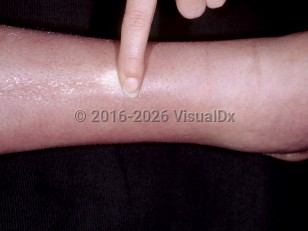Familial Mediterranean fever
Alerts and Notices
Important News & Links
Synopsis

Familial Mediterranean fever (FMF), also called recurrent polyserositis, is the most common disorder in a group of autoinflammatory syndromes known as periodic fever syndrome. These are diseases in which inborn errors in the immune system lead to unprovoked recurrent febrile episodes. FMF is an autosomal recessive disorder. The defective gene, termed MEFV, encodes pyrin, a protein component of the inflammasome complex, which is an intracellular organelle required for the production of interleukin (IL)-1 beta. Pyrin plays an important role in the regulation of inflammation and apoptosis, and mutated forms are thought to enhance overexpression of inflammatory cytokines.
FMF primarily affects people from the Mediterranean region, including those of Jewish, Armenian, Turkish, and Arabic descent. The development of amyloidosis is more prevalent among Sephardic Jewish and Turkish individuals. Fifty-five percent of patients present with symptoms before the age of 5, and 90% before the age of 20.
Typically, episodes of FMF are short (<3 days), resolve spontaneously, and can be triggered by several different factors such as stress, physical activity, or viral illness. Episodes can occur as often as once per week, but tend to decrease in frequency with patient age. Prodromal symptoms can occur around episodes; these include headache, nausea, vomiting, diarrhea, constipation, dyspnea, and low back pain. Apart from fever, the most common feature of FMF is serositis, which manifests as abdominal pain due to peritonitis in up to 90% of patients. Peritonitis can cause abdominal pain that mimics an acute surgical abdomen or renal colic. FMF can also present as arthritis due to synovitis (up to 75% of patients), which presents as pain and swelling of joints and can lead to chronic degenerative arthritis, or chest pain due to pleuritis (45% of patients). In up to 50% of cases, recurrent erysipelas-like erythema affecting the lower extremities occurs.
Other systemic associations include acute orchitis, splenomegaly, retinopathy, hypothyroidism, neurological symptoms, and immunoglobulin A vasculitis (formerly Henoch-Schönlein purpura). Purpura on the face, trunk, and extremities may also occur in children. Bullae have also been reported as occurring in association with FMF. Other associated cutaneous features include urticaria, angioneurotic edema, recurrent purpura, Raynaud phenomenon, and subcutaneous nodules.
Amyloidosis type AA is the most significant complication of FMF, developing in up to half of untreated patients. Typically, the kidneys are affected, leading to nephrotic syndrome and ultimately renal failure. Other long-term sequelae of FMF include peritoneal adhesions, causing intestinal obstruction or infertility, and amyloidosis of the liver and spleen.
Correctly diagnosing FMF can take up to 5 years. In children in particular, diagnosis can be challenging when a cyclic fever is the only clinical finding in the absence of a family history.
FMF primarily affects people from the Mediterranean region, including those of Jewish, Armenian, Turkish, and Arabic descent. The development of amyloidosis is more prevalent among Sephardic Jewish and Turkish individuals. Fifty-five percent of patients present with symptoms before the age of 5, and 90% before the age of 20.
Typically, episodes of FMF are short (<3 days), resolve spontaneously, and can be triggered by several different factors such as stress, physical activity, or viral illness. Episodes can occur as often as once per week, but tend to decrease in frequency with patient age. Prodromal symptoms can occur around episodes; these include headache, nausea, vomiting, diarrhea, constipation, dyspnea, and low back pain. Apart from fever, the most common feature of FMF is serositis, which manifests as abdominal pain due to peritonitis in up to 90% of patients. Peritonitis can cause abdominal pain that mimics an acute surgical abdomen or renal colic. FMF can also present as arthritis due to synovitis (up to 75% of patients), which presents as pain and swelling of joints and can lead to chronic degenerative arthritis, or chest pain due to pleuritis (45% of patients). In up to 50% of cases, recurrent erysipelas-like erythema affecting the lower extremities occurs.
Other systemic associations include acute orchitis, splenomegaly, retinopathy, hypothyroidism, neurological symptoms, and immunoglobulin A vasculitis (formerly Henoch-Schönlein purpura). Purpura on the face, trunk, and extremities may also occur in children. Bullae have also been reported as occurring in association with FMF. Other associated cutaneous features include urticaria, angioneurotic edema, recurrent purpura, Raynaud phenomenon, and subcutaneous nodules.
Amyloidosis type AA is the most significant complication of FMF, developing in up to half of untreated patients. Typically, the kidneys are affected, leading to nephrotic syndrome and ultimately renal failure. Other long-term sequelae of FMF include peritoneal adhesions, causing intestinal obstruction or infertility, and amyloidosis of the liver and spleen.
Correctly diagnosing FMF can take up to 5 years. In children in particular, diagnosis can be challenging when a cyclic fever is the only clinical finding in the absence of a family history.
Codes
ICD10CM:
E85.0 – Non-neuropathic heredofamilial amyloidosis
SNOMEDCT:
12579009 – Familial Mediterranean fever
E85.0 – Non-neuropathic heredofamilial amyloidosis
SNOMEDCT:
12579009 – Familial Mediterranean fever
Look For
Subscription Required
Diagnostic Pearls
Subscription Required
Differential Diagnosis & Pitfalls

To perform a comparison, select diagnoses from the classic differential
Subscription Required
Best Tests
Subscription Required
Management Pearls
Subscription Required
Therapy
Subscription Required
References
Subscription Required
Last Reviewed:05/23/2017
Last Updated:01/16/2022
Last Updated:01/16/2022
Familial Mediterranean fever

